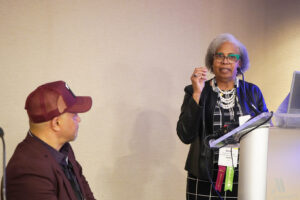

Our CEO Chris Chatmon was an integral part of a powerful panel presentation at the American Educational Research Association (AERA) conference in Chicago on April 14 presenting with other education leaders and luminaries. Dr. Vajra Watson, Professor of Educational Leadership and Racial Justice at Sacramento State University, recently designed the presentation “Living Hip-Hop: The Community-Based Organization as a Space for Educational Liberation.” This presentation centered around the use of Hip-Hop in class to draw students to writing and expressing themselves which improves literacy and well-being.
The panelists included: Chris Chatmon, the Founder and CEO of Kingmakers of Oakland; Denisha ‘Coco’ Bland, the Associate Director of Sacramento Area Youth Speaks (SAYS) at UC Davis; Patrice Hill, the Director of SAYS at UC Davis, and Sal Villalobos, the Program Director at United Playaz in San Francisco. The discussant was Dr. Gloria Ladson-Billings, a former Distinguished Professor of Urban Education at the University of Wisconsin-Madison. The panel was chaired by Dean Dr. Pedro Noguera, a Distinguished Professor of Education at the University of Southern California.
 “You can connect with young people who appear to be disconnected and alienated in school, but have a lot to say about what is happening in their lives.” Dr. Noguera explained how intelligence and brilliance in students can be unseen or unrecognized, and consequently not developed, neither cultivated, nor channeled. So that brilliance is often not fully expressed.”
“You can connect with young people who appear to be disconnected and alienated in school, but have a lot to say about what is happening in their lives.” Dr. Noguera explained how intelligence and brilliance in students can be unseen or unrecognized, and consequently not developed, neither cultivated, nor channeled. So that brilliance is often not fully expressed.”
The panelists shared video vignettes of the strategies to integrate hip-hop in the classroom. They highlighted how hip-hop can be used to connect with students and provide them a platform to express their voices and experiences, and ultimately breed healing. The panelists also emphasized the importance of community-based organizations in this work, as they provide a safe and supportive space for students to explore their creativity and develop their skills.
The presentation and panel discussion were timely, as the use of hip hop in education continually gains increasing recognition. Hip-hop has been shown to be an effective tool for engaging students and promoting critical thinking and creativity. It can also help students develop a positive sense of self and a sense of community. The panelists’ work in community-based organizations demonstrates the potential of these organizations to support student learning and development in innovative ways.
 “Indeed Hip Hop has become the sound track for most marketing campaigns. I want you, when you go home go to YouTube, look for a Flintstones 1992 (1988) commercial, where Barney comes in channelling Run DMC. He got on a corquin hip-hop hat. He got on a big gold chain. And when have you ever seen Flintstones having shoes on? Barney had on Adidas. He was wearing Adidas, 1992 (1988). All the way up to Nabisco selling Oreos with Wiz Kalifa today,” Dr. Gloria Ladson-Billings pointing out the power and persuasion of hip-hop. “The people in the marketing segment understand that this is a money maker, and they are going to keep using it. We try to keep it out of our classroom.”
“Indeed Hip Hop has become the sound track for most marketing campaigns. I want you, when you go home go to YouTube, look for a Flintstones 1992 (1988) commercial, where Barney comes in channelling Run DMC. He got on a corquin hip-hop hat. He got on a big gold chain. And when have you ever seen Flintstones having shoes on? Barney had on Adidas. He was wearing Adidas, 1992 (1988). All the way up to Nabisco selling Oreos with Wiz Kalifa today,” Dr. Gloria Ladson-Billings pointing out the power and persuasion of hip-hop. “The people in the marketing segment understand that this is a money maker, and they are going to keep using it. We try to keep it out of our classroom.”
Through their use of hip hop, the panelists demonstrated how students can be engaged and empowered to develop their literacy skills and explore their creativity. This work is particularly important in today’s educational landscape, where students from marginalized communities face significant challenges in accessing relevant curriculum and a quality education.
Dr. Ladson-Billings who was the 2005-2006 president of the AERA, has been examining the pedagogical practices of teachers who are successful with African American students over the past four decades. She acknowledged, “I’m just so impressed with the work that you guys (panelists) are doing.”
